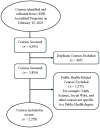A narrative review of the CEPH-accredited bachelor's public health programs' curricula in the United States
- PMID: 39234095
- PMCID: PMC11371682
- DOI: 10.3389/fpubh.2024.1436386
A narrative review of the CEPH-accredited bachelor's public health programs' curricula in the United States
Abstract
Background: Undergraduate programs in public health are becoming increasingly popular in the United States (US). The recent pandemic, growing climate instability, and the aging baby boomers have led to higher demands for skilled public health professionals at various levels of the workforce. This study examines the nature of courses being delivered in undergraduate public health programs across the United States. The goal is to assess domains, themes, competencies, and other specialized skills that are currently covered in these academic programs.
Methodology: A search was conducted in February 2023 using the online CEPH program database to identify undergraduate public health programs in the US. In total, 86 institutions and 90 CEPH-accredited undergraduate public health programs were identified. Lists of public health courses were retrieved from each program, and a total of 2,259 unduplicated courses were extracted and analyzed. A content analysis of the extracted topics was conducted to generate 38 common themes among the courses offered. Coded course themes were mapped to the public health domains and competencies listed by the ASPPH and CEPH to evaluate the distribution of themes across course offerings.
Results: Analysis of course themes found that Foundations of Public Health, Epidemiology, Public Health Management, Policy, and Leadership, Climate and Environmental Health, and Global Health Issues were the most prevalent. When course themes were mapped onto the ASPPH and CEPH domains of critical public health learning, "overview of public health" and "determinants of health" were the most populated domains. Programs had different emphases according to their approach, but overall, about two-thirds of course themes were focused on foundational and theoretical concepts of public health, and one-third were directed toward practical applications of public health concepts.
Conclusion: As the demand for skilled public health workers continues to rise, programs will need to watch the skills and competencies required in the current working environment, as well as the ASPPH and CEPH criteria, and adjust their approach accordingly. Given the rapid changes in the public health landscape, schools and programs of public health should evaluate their curricula to ensure that they are meeting the needs of the workforce and the world.
Keywords: ASPPH; BAPH; BSPH; CEPH; United States; public health curriculum; public health education; undergraduate public health programs.
Copyright © 2024 Kedia, Entwistle, Magaña, Seward and Joshi.
Conflict of interest statement
The authors declare that the research was conducted in the absence of any commercial or financial relationships that could be construed as a potential conflict of interest.
References
-
- Institute of Medicine (US) In: Gebbie K, Rosenstock L, Hernandez LM, editors. Who will keep the public healthy? Educating public health professionals for the 21st century: National Academies Press (US) (2003) Available at: http://www.ncbi.nlm.nih.gov/books/NBK221182/ (Accessed November 2, 2022). - PubMed
Publication types
MeSH terms
LinkOut - more resources
Full Text Sources
Research Materials


